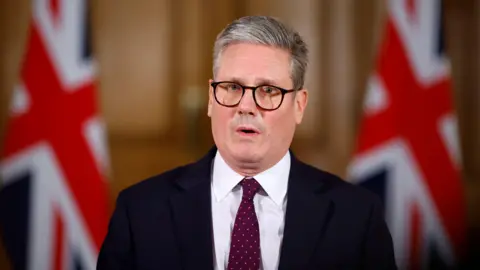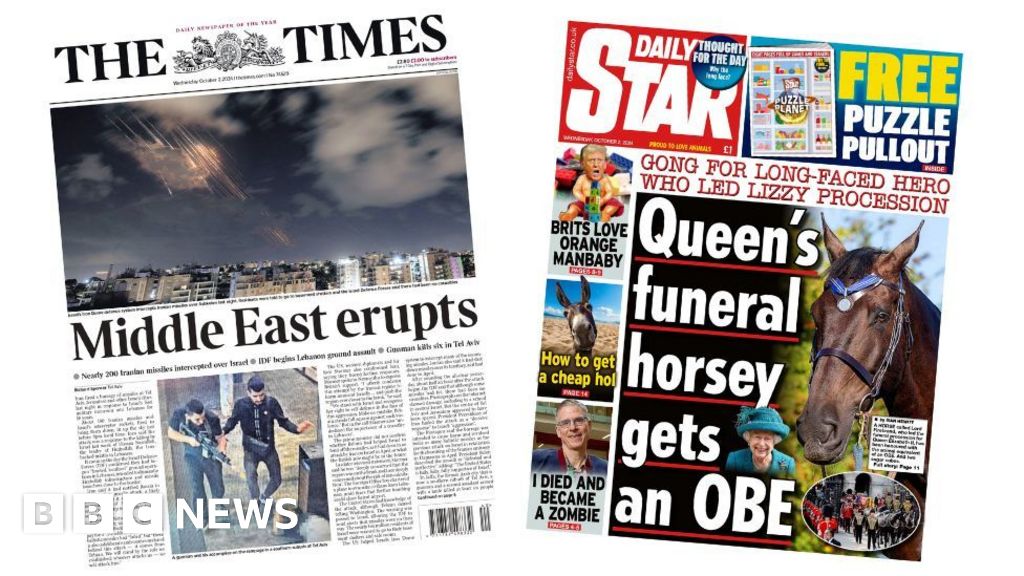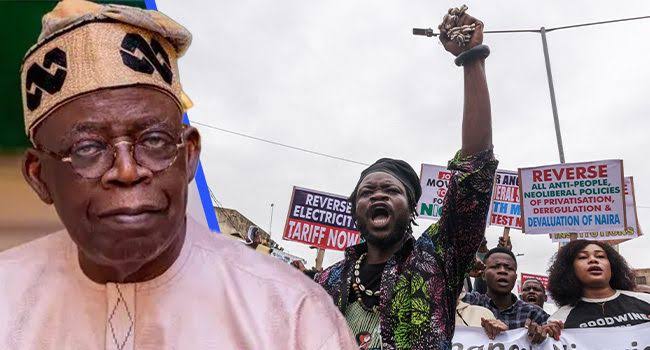
 PA Media
PA Media
British forces were involved in an operation to help "prevent further escalation in the Middle East", the defence secretary has confirmed, after Iran launched a missile attack on Israel.
In a statement, John Healey condemned the attack but did not give any further details of what role the UK had played in the response to it.
In April British fighter jets shot down a number of drones fired at Israel from Iran.
In the latest attack on Tuesday evening, the Israeli military said around 180 missiles were fired from Iran, most of which were intercepted.
Iran’s Islamic Revolutionary Guard Corps said it launched the missiles in retaliation for recent attacks that killed the leaders of Hezbollah and Hamas, as well as a senior Iranian commander.
Mr Healey said: "British forces have this evening played their part in attempts to prevent further escalation in the Middle East.
"I want to thank all British personnel involved in the operation for their courage and professionalism.
"The UK stands fully behind Israel's right to defend its country and its people against threats."
Earlier Prime Minister Sir Keir Starmer used a televised address from Downing Street to condemn Iran's attack on Israel, saying he is "deeply concerned that the region is on the brink".
"We stand with Israel and we recognise her right to self-defence in the face of this aggression," he said.
Calling on Iran to stop its attacks, Sir Keir said: "Together with its proxies like Hezbollah, Iran has menaced the Middle East for far too long, chaos and destruction brought not just to Israel, but to the people they live amongst in Lebanon and beyond.
"Make no mistake, Britain stands full square against such violence. We support Israel's reasonable demand for the security of its people."
Sir Keir was on the phone to his Israeli counterpart Benjamin Netanyahu when the Iranian attacks began.
The two men had been speaking for around 15 minutes – about the prospect of missiles being fired by Tehran – when Netanyahu had to abandon the call because he had been told the attacks were under way.
During their call, Sir Keir also underlined the importance of a ceasefire in Lebanon and Gaza.
Conservative Party leader Rishi Sunak said: "We stand unequivocally by Israel's right to defend itself including against Hezbollah in Lebanon."
In his statement, the prime minister repeated his advice to British nationals to leave Lebanon, warning the situation was becoming "increasingly grave".
He added: "If you have the means to leave, the time is now. Do not wait."
Britons in Lebanon have been advised to register their presence with officials on the government's website and a UK-chartered plane is leaving Beirut on Wednesday.
But some told the BBC they had received no confirmation or details about their booking on the government-chartered flight, despite paying for a seat.
As of last week, there were thought to be between 4,000 and 6,000 UK nationals, including dependants, in Lebanon.
The missile attack came hours after Israel launched a ground invasion in southern Lebanon, in what it has described as "limited, localised and targeted" raids against the armed group Hezbollah, which is backed by Iran.
Lebanese officials say more than 1,000 people have been killed following Israeli air strikes over the past two weeks. Hezbollah has responded by firing hundreds of rockets into northern Israel.
The previously sporadic cross-border fighting between Israel and Hezbollah escalated on 8 October 2023 - the day after the unprecedented attack on Israel by Hamas gunmen from the Gaza Strip - when Hezbollah fired at Israeli positions, in solidarity with the Palestinians.

 2 hours ago
25
2 hours ago
25















 English (US) ·
English (US) ·